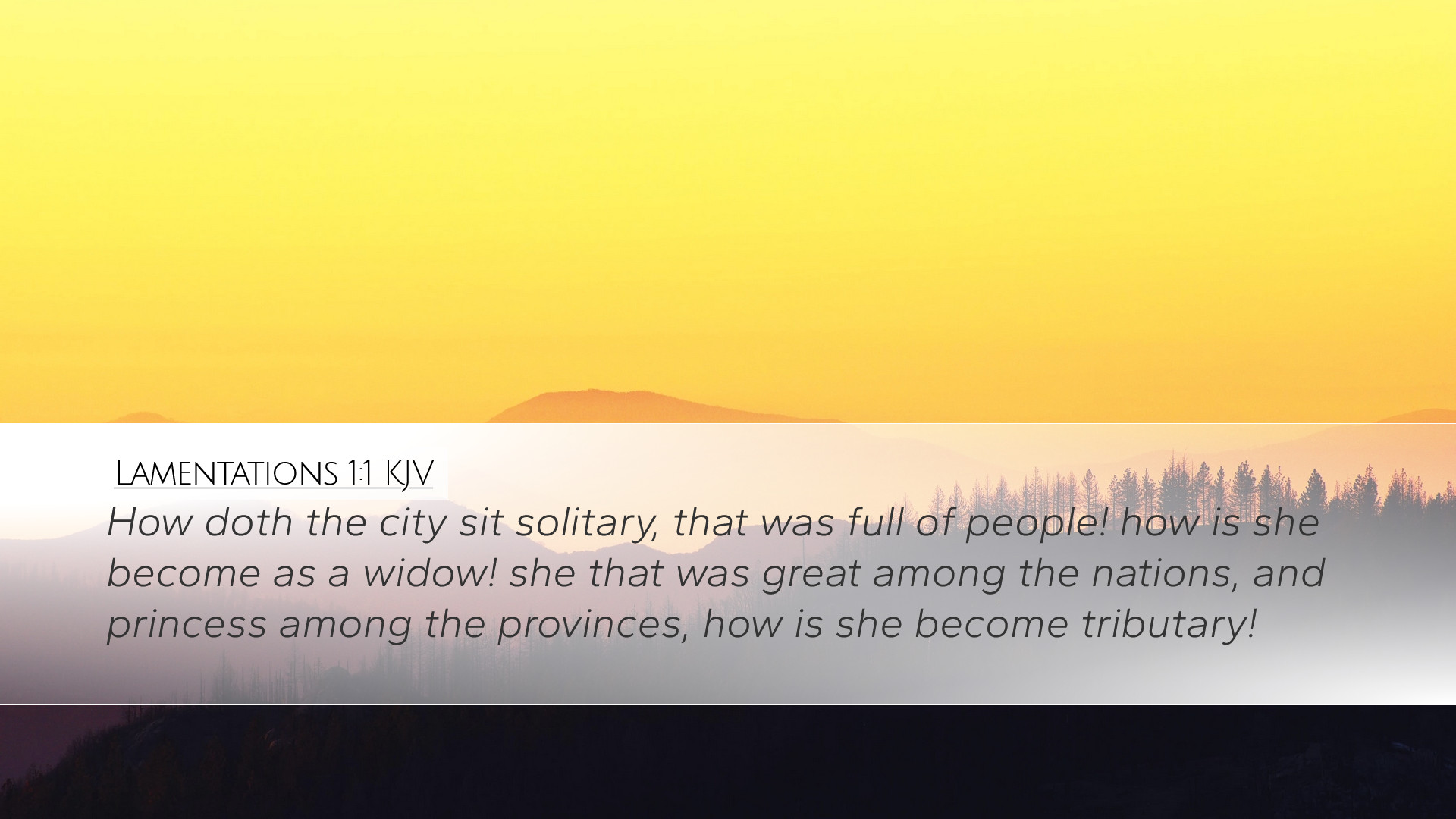Lamentations 1:1 - Commentary Summary
Verse: "How lonely sits the city that was full of people! How like a widow is she, who was great among the nations! The princess among the provinces has become a slave!"
This verse serves as the poignant introduction to the Book of Lamentations, establishing the tone of grief and despair that permeates the text. It offers a powerful image of the devastation of Jerusalem after its destruction and captures the deep sense of loss experienced by its inhabitants.
Contextual Background
The Book of Lamentations is traditionally attributed to the prophet Jeremiah, composed in the aftermath of the Babylonian exile in 586 B.C. In it, the author mourns the catastrophic fall of Jerusalem and the resulting suffering of the people. This first verse sets the stage for the exploration of themes such as sorrow, loss, divine judgment, and ultimately, hope.
Interpretations from Public Domain Commentaries
Matthew Henry's Commentary
Matthew Henry remarks on the profound sense of desolation that overtakes the once-mighty city of Jerusalem. He highlights that the city was a hub of life and activity, yet through divine judgment, it has crumbled to a state of isolation and mourning. Henry notes the evocative metaphor of Jerusalem as a widow, which embodies vulnerability and loss, suggesting that even the strongest among nations can face utter downfall.
Albert Barnes' Notes on the Whole Bible
Barnes draws attention to the emotional depth present in this verse. He highlights Jerusalem's transformation from a prosperous city to one that sits in solitude, reflecting the weight of divine wrath. The imagery speaks not only to physical destruction but also to the spiritual and social ramifications this destruction carries. He interprets the phrase "the princess among the provinces" as indicative of Jerusalem's former glory, which serves as a backdrop to its current plight—a metaphor that finds resonance in the experiences of those who have known both great favor and devastating loss.
Adam Clarke's Commentary on the Bible
Adam Clarke expands on the metaphor of Jerusalem as a widow, emphasizing the cessation of joy and the deep grief characterizing her state. Clarke explains that the contrast between Jerusalem’s previous abundance and her present desolation is striking, underscoring the fragility of human pride and the dire consequences of disobedience to God. He offers insights into how this describes not only a physical but also an emotional and spiritual barrenness that can be applicable to individual believers and communities at large.
Theological Implications
This verse encourages deep reflection on several theological themes:
- The Reality of Divine Judgment: The destruction of Jerusalem serves as a stark reminder of the reality of divine judgment resulting from sin. Its once glorious state is diminished, which cautions believers on the consequences of turning away from God's path.
- The Nature of Loss: The metaphor of the widow evokes empathy and highlights how loss can strip away identity and purpose. It invites readers to consider not only collective suffering but also personal grief and what it means to endure such trials.
- Hope Amidst Despair: Although Lamentations explores grief, readers must also note the underlying hope that becomes evident in later chapters. The acknowledgment of suffering paves the way for restoration, which holds significant meaning for those in despair.
Practical Applications for Pastors and Theologians
For pastors and theologians, Lamentations 1:1 serves as a rich source for several practical teachings:
- Emotional Honesty: This verse invites congregations to acknowledge and express their grief openly. Pastors can leverage it to promote a culture of emotional honesty within the church.
- The Importance of Remembrance: Reflecting on past glories and failures can guide congregations in recognizing God's faithfulness despite present hardships.
- Encouragement in Suffering: Teaching through Lamentations can provide comfort by reminding congregants that sorrow is a part of human experience, yet also an avenue to encounter God's compassion and purpose.
Conclusion
Lamentations 1:1 is a powerful introduction to a profound meditation on loss and divine judgment. It serves as a reminder of the fragility of human life and the consequences of turning away from God. The insights from Matthew Henry, Albert Barnes, and Adam Clarke deepen the understanding of this verse and highlight its relevance for believers today. By engaging with this text, pastors, students, and scholars can draw meaningful lessons on grief, restoration, and the hope that lies within God's character.


